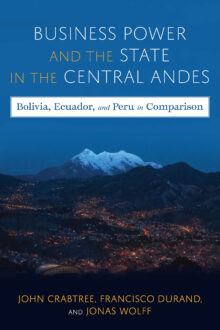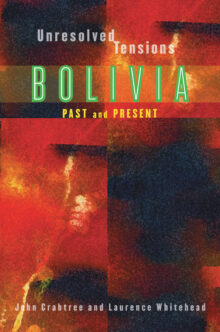

John Crabtree
John Crabtree is research associate at the Latin American Centre at the University of Oxford, associate of the Politics Department at Brookes University in Oxford, and region head for Latin America at Oxford Analytica Ltd.
Business Power and the State in the Central Andes
Bolivia, Ecuador, and Peru in Comparison
This coauthored monograph examines how business groups have interacted with state authorities in the three central Andean countries from the mid-twentieth century through the early twenty-first. This time span covers three distinct economic regimes: the period of state-led import substitutive industrialization from the 1950s through the 1970s, the neoliberalism of the 1980s and 1990s, and the post-neoliberal period since the earlier 2000s. These three countries share many similarities but also have important differences that reveal how power is manifested. Peru has had an almost unbroken hegemony of business elites who leverage their power over areas of state activity that affect them. Bolivia, by contrast, shows how strong social movements have challenged business dominance at crucial periods, reflecting a weaker elite class that is less able to exercise influence over decision-making. Ecuador falls in between these two, with business elites being more fragmented than in Peru and social movements being weaker than in Bolivia. The authors analyze the viability of these different regimes and economic models, why they change in specific circumstances, and how they affect the state and its citizens.
Unresolved Tensions
Bolivia Past and Present
The landslide election of Evo Morales in December 2005 pointed toward a process of accelerated change in Bolivia, forging a path away from globalization and the neoliberal paradigm in favor of greater national control and state intervention. This in turn shifted the power relations of Bolivia’s internal politics-beginning with greater inclusion of the indigenous population-and altered the nation’s foreign relations. Unresolved Tensions engages this realignment from a variety of analytical perspectives, using the Morales election as a lens through which to reassess Bolivia’s contemporary political reality and its relation to a set of deeper historical issues. This volume brings together an expert group of commentators and participants from within the Bolivian political arena to offer diverse perspectives and competing views on issues of ethnicity, regionalism, state-society relations, constitutional reform, economic development, and globalization. In this way, the contributors seek to reassess Bolivia’s past, present, and future, consider the ways in which the nation’s historical developments flow from these deeper currents, and assess the opportunities and challenges that arise within the new political context.


